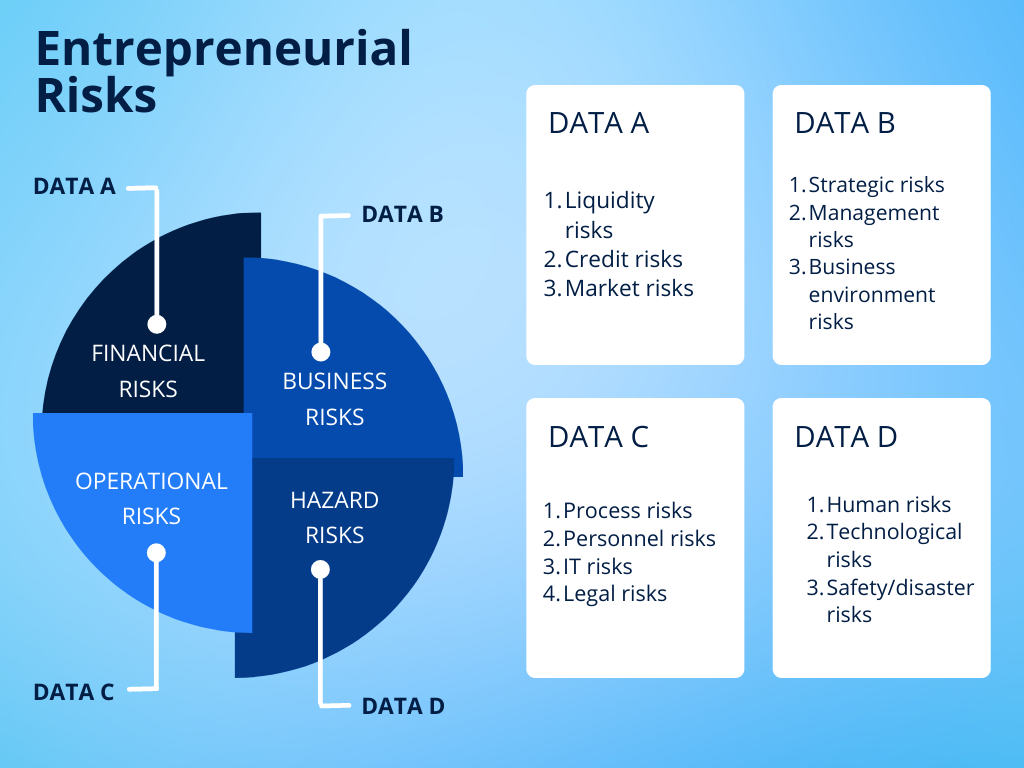What does it take to become a risk-taking entrepreneur? How important are risks in an entrepreneurial journey? Why do entrepreneurs take risks? Keep reading as we share the role of risks in business success.

Introduction
Risk-taking is key to the entrepreneurial spirit. After all, in a world fuelled by dynamic change, the biggest risk in an “entrepreneurial journey” is not taking any risk. Testifying this claim are some of the worlds most notable business leaders that believe most successful entrepreneurs are often 1) outsiders, 2) optimistic, and 3) solution-oriented.
“Such innate characteristics help them put in the required time and effort in their quest to create something new and take crucial business decisions.”
But, how important is risk-taking in the life of an entrepreneur? What are the different risks entrepreneurs face? What should they do to take calculated risks? In this post, we will try answering such questions and figure out the role of risks in building a successful entrepreneur. Let’s get started!
What are the risks entrepreneurs face?
With no guaranteed monthly income and success and a life away from friends and families, entrepreneurs tend to face multiple risks. Hence, they should plan wisely. Here are some of the most common risks every budding entrepreneur should consider before starting a business.

● Strategic risk
Strategies in the fast-paced business world become outdated quickly. This is quite concerning since entrepreneurs need to develop business plans that appeal to potential investors. Entrepreneurs have to consider the changes in the market and business environment while developing a strategy. Failing to perform strategic risk analysis might make a company struggle to achieve the set standards.
● Financial risk
Entrepreneurs need funds to launch a business. Such funds are often in the form of loans provided from investors, families, savings, or banks. Therefore, a sound financial plan is imperative for entrepreneurial success. You will have to put your skin in the game and create a business plan that projects expenses and returns in a five-year timeframe.
● Technology risk
Business owners depend on modern-day technologies to fuel their entrepreneurial ambitions. However, such technologies are always on the move as new technologies are constantly emerging. Disruption is a major risk to entrepreneurs since such paradigm shifts are quite challenging to overcome without a loss of competitive edge. It’s critical that entrepreneurs stay aware of new technologies and if any could threaten their business
● Competitive risk
One of the biggest entrepreneurial risks is the ever-evolving competition. Entrepreneurs should worry both when they have too many competitors and when they have zero competition in the market. The market is deemed saturated if there are too many large competitors. A market with zero competition often means that there is no demand for a product.
● Market risk
Business success depends largely on the market. The latest market trends and economic fluctuations might pose a serious threat to your existing business strategy. In other words, the products that seem popular today might lose their grip on the market in a few months. Moreover, competitors that launch similar products or services often take a share of the market and affect your revenue.
● Reputational risk
Business reputation is a major factor that fuels customers’ and investors’ preconceived expectations. Companies that don’t match customer standards struggle to gain traction. Moreover, negative business reputation on social media or other public outlets might lead to huge losses in revenue. This is where reputational management strategies come to save the day. Such risks can also be managed through proper communication strategy for building deep business-customer relationships.
● Other business risks
There are several risks that are out of our control. For example, no business plan can ever prepare for risks like earthquakes, tornadoes, hurricanes, wars, and recession. Moreover, entrepreneurs might find it difficult to set up a business in under-developed countries, especially the ones with active political instability.
Reasons why entrepreneurs take risks

The risks we discussed often result in over thirty percent of startups failing within two years. Indeed, you can plan well to avoid such entrepreneurial risks. But, one should realize that things might get real difficult real soon. Successful entrepreneurs leverage risks to improve their business skills, which further helps them generate better results. Here are some of the reasons why entrepreneurs should never back down from taking risks.
Overcome fear of the unknown
While the risks of entrepreneurial decisions are known, nobody knows if they will pay off. The fear of the unknown is real but shouldn’t stop you from making major business decisions. After all, risks are necessary to build a successful business since you don’t know what the future holds. However, one can easily navigate through the fear of the unknown by developing business strategies, exploring new ideas, and closely monitoring business performance.
Major learning opportunity
Entrepreneurs learn from taking risks and making high stake decisions as it’s a massive opportunity to boost business growth. Your willingness to experiment with new ideas and take risks help adjust your current business strategy and create a system that helps assess your business decisions. Indeed, there will be decisions that might not go your way. But, such risk-oriented decisions bring enough lessons to fuel your next move forward.
Innovation
Risk is a cost of opportunity and innovation. It helps determine the constantly changing customer demands and creates enough opportunities for business growth. Innovation is a result of highly-calculated risks. However, business owners should lessen the level of risk by making all possible calculations and evaluations.
Risks for competitive advantage
Risk-takers have no fear of competition. They leverage the first-mover advantage and jump on an opportunity the moment they get a window. Such risks help them reap massive benefits as they keep dominating their market share.
How should entrepreneurs take better risks?

While risk-taking helps improve self-confidence, develop new skills, and gain massive financial rewards, one should never underestimate its downsides. But, can we overcome the possible disadvantages of entrepreneurial risks? Here are some quick tips you can use to become a better risk-taker in no time.
1. Assess risks
Putting the right foot forward is crucial to solving risk-related entrepreneurial problems. We suggest you begin by weighing the big risks involved in the decision. The best way to do this is by developing a system that helps point out the risks involved. Create a list of the pros and cons of taking risks. It helps assess whether or not you should take the risk.
2. Don’t fear failure
Fear of failure is a massive factor for entrepreneurs that don’t embrace risks. They obsess over a worst-case scenario and magnify the potential risks out of proportion. Their lack of intent and fear of falling often keeps them from taking their life or career to the next level. The best way to maneuver in such situations is by focusing on the potential positive outcomes.
3. Assess the upsides
Indeed, the idea of making a significant change in life might sound daunting. The unknown levels of change might fog your sense of judgment and stop you from taking risks. Instead of focusing on the downsides, figure out the reasons why you are considering taking risks. Think about what significant positive changes the decision will bring and whether or not the positives are worth taking the risk.
4. Take on incremental risks
If risk-taking doesn’t come naturally to you, consider taking baby steps. It keeps you from putting too much on the line. You escape the risk of going all in and get enough time to assess the decision. Indeed, it will slow the process down a little. But, it will give you enough strength to stay on the path of change.
5. Seek help from the experienced
Lastly, you should figure out the possible results of the risks by seeking help from the experienced. Find and connect with people that have walked the walk and taken the entrepreneurial journey you are on. Share your concerns and let them suggest solutions that will help you overcome the challenges. Feel free to consult professional services or executive coaching to find smart solutions to your entrepreneurial problems.
Key takeaways!
Are you interested in becoming an entrepreneur? Do qualities like risk-taking resonate with you? It’s big-time you take a giant leap towards building your own venture. We suggest you do your due diligence on how to start a business and let your entrepreneurial instincts drive you to success. However, you should be ready to take risks in your journey to become a true business visionary and leader that encourages innovation. Did you find this post helpful? Let us know in the comments. Also, don’t forget to check out other informative posts on the blog!
